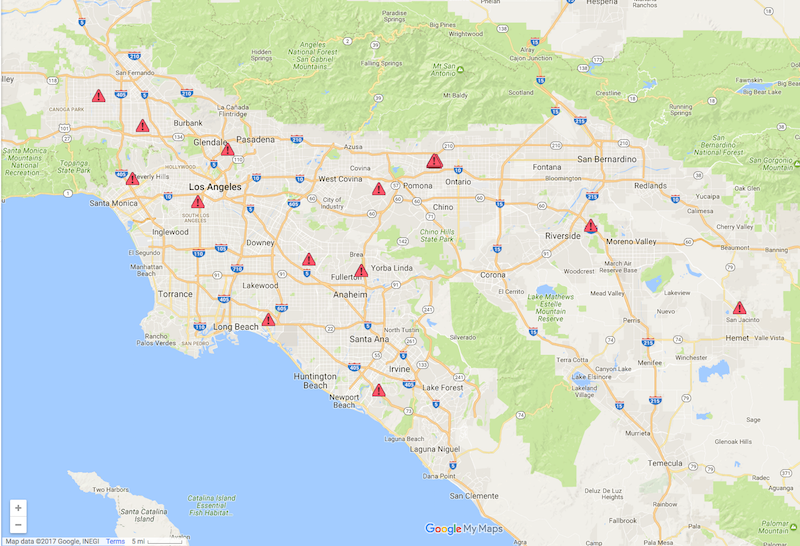The Jewish non-profit organization AMCHA Initiative has released its annual study, which states that anti-Semitism has increased on college campuses nationwide by 40 percent in 2016. “Amcha” is the Hebrew word for “your people,” or “your nation.”
Cal State Long Beach also appeared on the group’s website, specifically on several interactive maps meant for tracking anti-Semitic hate crimes.
The study titled, “Antisemitism: At the Epicenter of Campus Intolerance,” stated that the number of discrete anti-Semitic incidents rose on colleges throughout the U.S. However, the research also indicates that fewer colleges are experiencing incidents, showing a nine percent decrease compared to 2015.
The study’s lead researchers, Tammi Rossman-Benjamin and Leila Beckwith, postulate that this trend is due to a rising number of “hotspots.” The hotspot schools with the sharpest rise in anti-Semitic activity in 2016 were Columbia University, Vassar College, New York University, the University of Chicago and the University of Wisconsin Madison.
“It is important to point out that each of the schools [with the largest spikes in anti-Semitism] was one of the 11 schools whose student governments, graduate student associations or student bodies considered BDS (Boycott, Divestment, Sanctions) resolutions in 2016, but not in 2015,” wrote Rossman-Benjamin and Beckwith in the study. “This undoubtedly accounts for the surge in overall antisemitic [sic] activity.”
The BDS movement is a global initiative organized and run by the Palestinian BDS National Committee that attempts to mount economic and political pressure against the state of Israel. The movement is controversial, as proponents compare it to anti-Apartheid movements in South Africa, while detractors say it promotes anti-Semitism and the delegitimization of Israel.
The AMCHA Initiative considers events or actions to be anti-Semitic on two main grounds: “classic” anti-Semitism, related to hatred directed at Jewish students due to their ethnicity or religious practices, and anti-Zionism, related to actions made against or in protest of the state of Israel. According to the study’s data and the press-release that came from the organization, the two types of activity are linked, which was consistent with its previous findings in the 2015 study.
One of the causes of multiple occurrences at CSULB came from a hacking incident in March 2016. Andrew “Weev” Auernheimer, a “notorious neo-Nazi hacker troll” according to Matt Coker of the OC Weekly who covered the incident, accessed public Wi-Fi networks on colleges throughout the country to print anti-Semitic fliers on several college campuses, including CSULB. The fliers featured swastikas and advocated that white men should “join us in the struggle for white supremacy” at the Daily Stormer, a neo-Nazi website.
Another CSULB incident that appeared on the AMCHA website’s interactive map was related to the defacement of a poster advertising history professor and chair of Jewish Studies Jeffrey Blutinger’s Spring 2017 class on Israel’s history, people and cultures. Someone had written, “not a valid course, Israel is occupied territory,” on the poster.
“That’s when I made the really, really big fliers,” Blutinger said of the incident. “Where as before there was a small flier there was now a really big flier that I put up. That was sort of my response. I’m really surprised that it shows up on their website, it was one single flier.”
A third incident listed on the AMCHA website referred to the CSULB campus group Students for Justice in Palestine’s annual Israel Apartheid Wall, which they listed as advocating for the BDS movement.
Blutinger stated that he does not share AMCHA’s opinion that anti-Semitism and anti-Zionism are always directly related, and said the issue is a complicated one.
“I think we have to be really careful about distinguishing between anti-Semitism and anti-Zionism,” Blutinger said. “Can you be anti-Zionist without being anti-Semitic? Yes, but it depends on why you’re anti-Israel. If you mean ‘anti-Israel’ as someone who criticizes Israeli policies, then by no means is that anti-Semitic, in the same way as someone who criticizes the policies of the US government is anti-American. If I don’t like Vladimir Putin, that doesn’t mean I’m anti-Russian.”
However, Blutinger stated that if someone opposes the idea of Israel as an ethno-state exclusively without opposing either nationalistic states or ethno-states in general, then the cause of the anti-Zionism is likely also anti-Semitic.
“You have to be consistent,” Blutinger said. “If you say you oppose Zionism because of ethnic nationalism, then I assume you also oppose the creation of a Palestinian state, which is also an ethnic nationalist state. Usually, no, they don’t. Then there’s a disconnect between what somebody says they believe, and what they’re actually advocating.”
Blutinger also said that AMCHA often promotes an agenda that is oriented with the political right in Israel, and he often didn’t share their views, considering himself more of a centrist.




